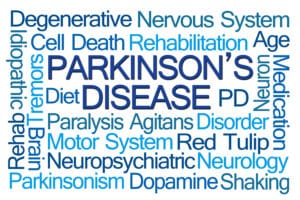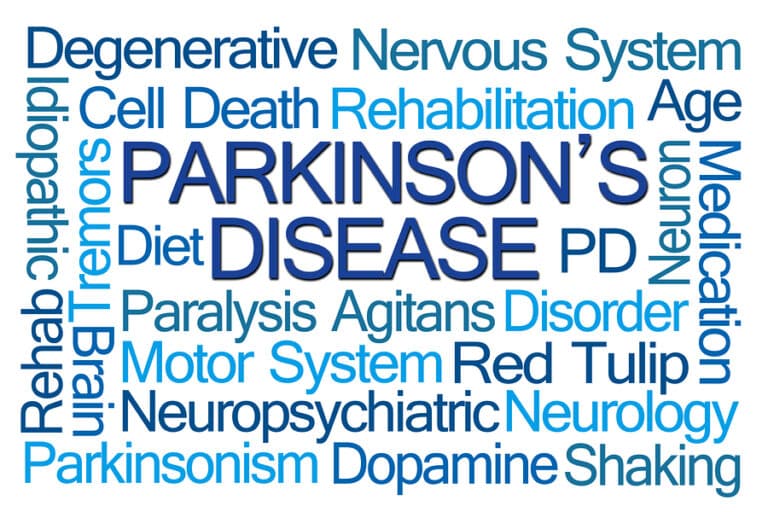Parkinson’s disease is a brain disorder that causes the body to move in ways that are uncontrollable or unintentional. A person with Parkinson’s disease may exhibit behaviors such as shaking or stiffness and an inability to make his body follow through with certain movements.
The most noticeable signs and symptoms of Parkinson’s disease occur when nerve cells in the area of the brain that controls movement (basal ganglia), become impaired and begin to die. These nerve cells, or neurons, normally produce an important brain chemical known as dopamine. When the neurons die or become impaired, they produce less dopamine, which causes the movement problems associated with Parkinson’s disease.
Men are more likely to develop Parkinson’s and the risk increases with age. Many folks who develop Parkinson’s don’t

even notice the early symptoms, instead, the people in their lives like their family and elder care team, are the first ones to see symptoms that might indicate a Parkinson’s diagnosis.
Symptoms usually begin gradually and slowly get worse. People may start to have difficulty walking and talking as the disease progresses. It’s also not uncommon for them to experience mental and behavioral changes, sleep problems, depression, memory difficulties, and fatigue.
Here is what to look out for if you suspect your loved one may have the beginning symptoms of Parkinson’s disease.
- A tremor in the hands, arms, legs, or jaw. Your loved one may find it difficult to pick up small objects like coins or safety pins and may ask his elder care provider to help with those tasks.
- A slowing down in his movement. You might see notice him taking a long time to sit down or stand back up.
- Developing a parkinsonian gait. When the person walks, he might tend to lean forward; take small, quick steps; and reduce swinging his arms. They also may have trouble initiating or continuing movement.
- Speaking too softly. Your elder care provider might notice that it’s hard to hear your loved one speak, that he’s always talking in whispers. Your loved one might be unable to raise his voice or make it more clearly heard.
- Loss of balance or coordination. Your loved one may not be able to correct himself if he loses his balance and will fall much more often or bump into items instead of walking around them. Stairs may become almost impossible for him to traverse without fear of falling.
- Depression. Some people with Parkinson’s may experience changes in their cognitive function, including problems with memory, attention, and the ability to plan and accomplish tasks. This can lead to depression and an inability to find joy in everyday activities.
- Difficulty in chewing and swallowing. If your parent seems to be choking on his food more often, it might be caused by his inability to chew well. Make sure to remind anyone who preps food for him, like his elder care provider, to cut food into small pieces.
There aren’t any blood or laboratory tests to diagnose non-genetic cases of Parkinson’s. Your loved one’s doctor will diagnose the disease by taking his medical history and performing a neurological examination.
If you or an aging loved one are considering hiring Elder Care in Laurens, SC, contact Heart of the Carolinas Home Care at 864-991-3116. Providing Home Care Services in Greenville, Simpsonville, Greer, Anderson, Spartanburg, Mauldin, Seneca, Laurens, Charleston, Columbia and the surrounding areas.
- 5 Ways Seniors Can Protect Themselves From Scams - July 26, 2024
- Five Tips for Putting Together a Home Safety Checklist for Seniors - July 10, 2024
- Understanding Spinal Stenosis - June 17, 2024

